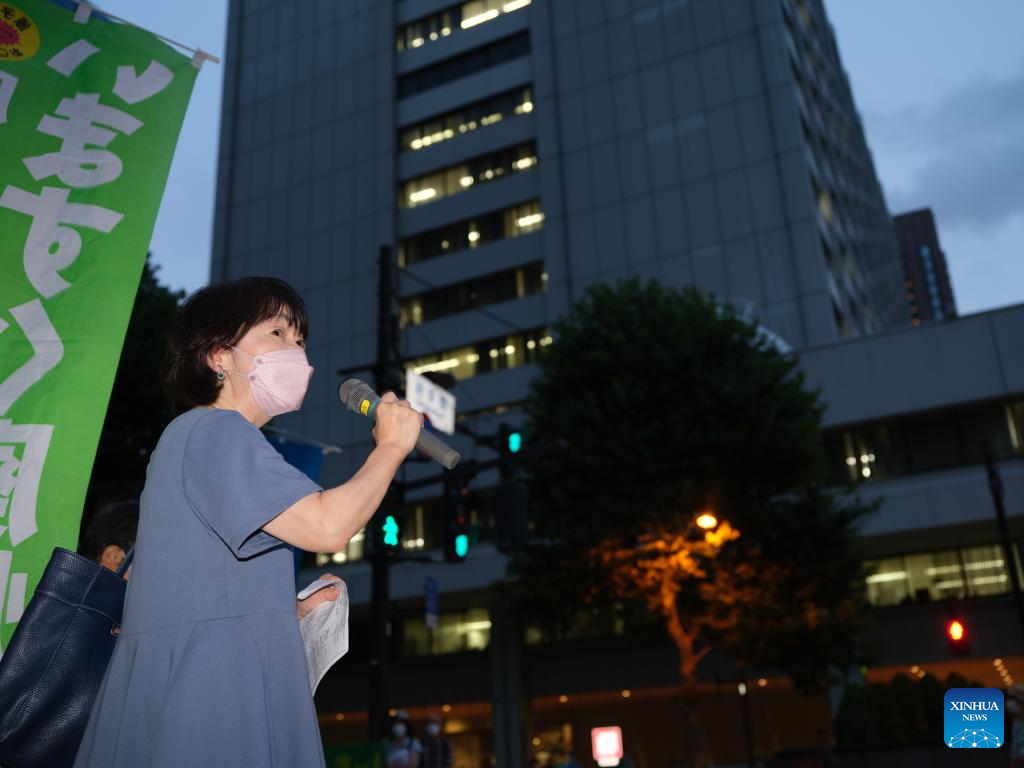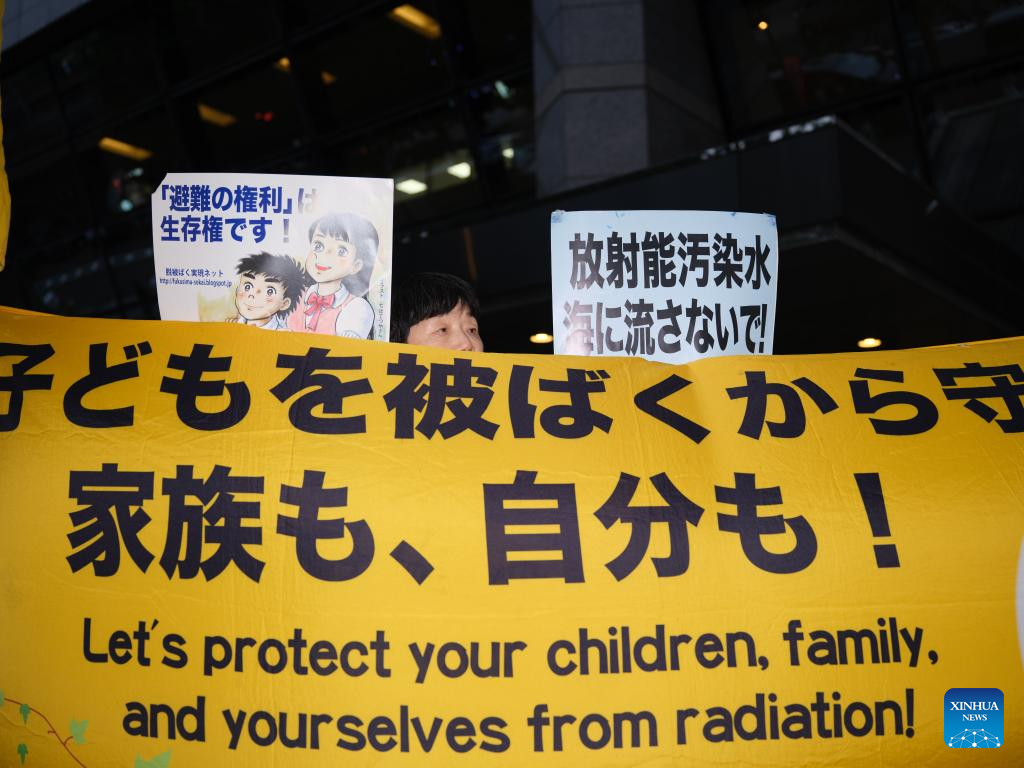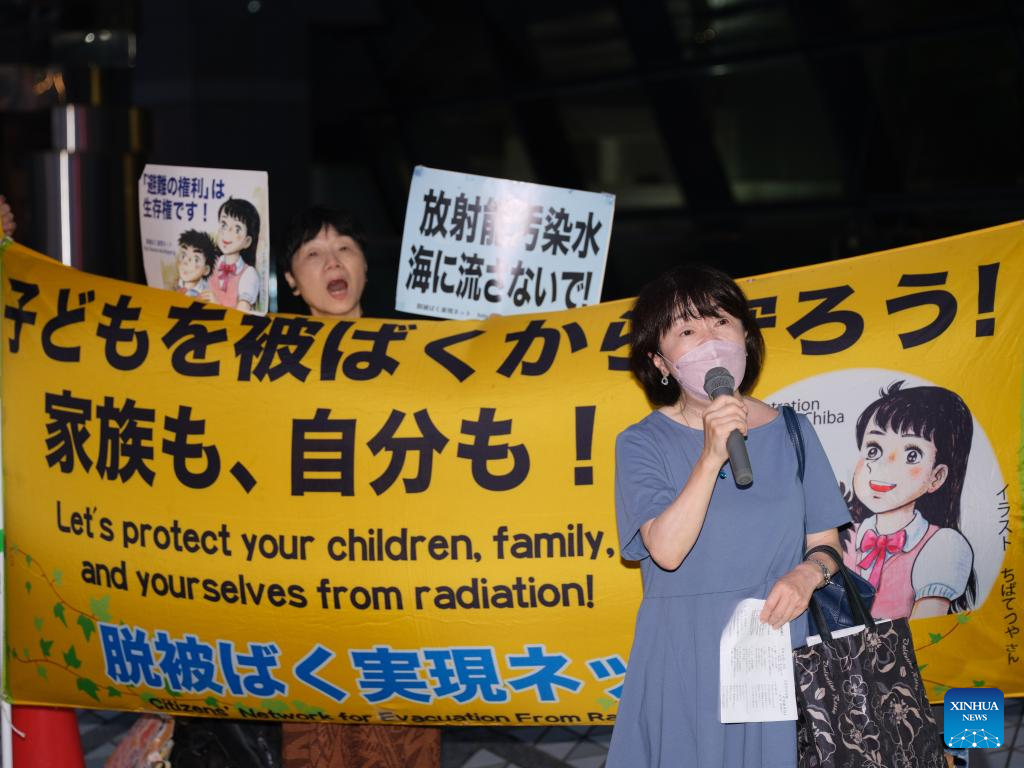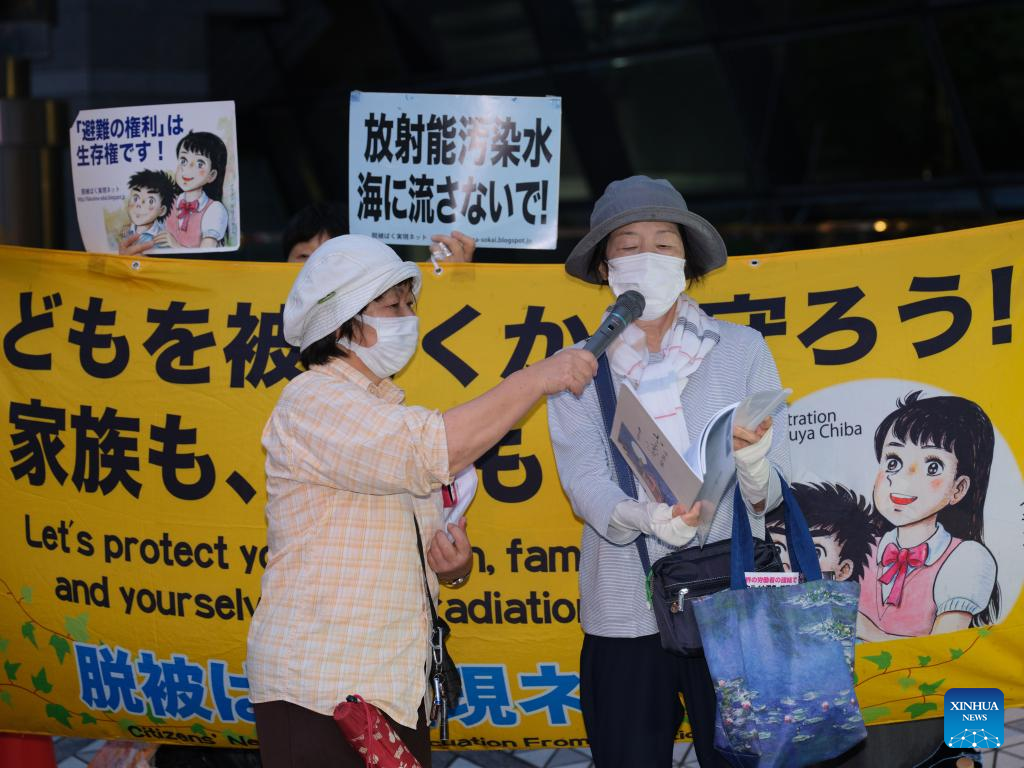
Protesters hold signs during a demonstration against Japan's nuke wastewater dumping plan in front of the headquarters of Tokyo Electric Power Company (TEPCO), the operator of the crippled Fukushima Daiichi Nuclear Power Plant, in Tokyo, Japan, July 5, 2023. Nearly a hundred Japanese protesters gathered on Wednesday to rally against Japan's plan to dump nuclear-contaminated wastewater into the Pacific Ocean, expressing their grave concern over the final report by the International Atomic Energy Agency (IAEA). (Xinhua/Zhang Xiaoyu)
TOKYO, July 5 (Xinhua) -- Nearly a hundred Japanese protesters gathered on Wednesday to rally against Japan's plan to dump nuclear-contaminated wastewater into the Pacific Ocean, expressing their grave concern over the final report by the International Atomic Energy Agency (IAEA).
The demonstration was held on Wednesday evening in front of the headquarters of Tokyo Electric Power Company (TEPCO), the operator of the crippled Fukushima Daiichi Nuclear Power Plant. Protesters from several local civic groups displayed placards that read "Do not discharge contaminated water into the sea" and "Do not pollute our oceans."
"TEPCO's so-called safety standards were fundamentally flawed," a protester surnamed Yamazaki told Xinhua, adding that there were no limitations on the total amount of nuclear-contaminated water to be discharged into the ocean, and the existing regulations on radioactive substance concentration were too lenient.
The middle-aged man, who strongly opposed the high concentration standards for nuclear-contaminated water set by the IAEA, emphasized that there were alternative methods available for handling the radioactive contaminated water.
"It is intolerable to release such a large quantity of water containing radioactive materials into the ocean, considering the potential hazards it may cause in the future," he said.
On Tuesday, the IAEA published its final comprehensive safety review report on Japan's ocean discharge plan, after IAEA Director General Rafael Grossi handed over the report to Japanese Prime Minister Fumio Kishida in Tokyo as the former kicked off a four-day visit to Japan at the invitation of Japan's foreign ministry.
The protesters expressed their disapproval regarding the report, saying that the Japanese government was simply "unreasonable" in taking the IAEA report as "a permit for ocean discharge" in total neglect of the opposition from local residents, the fishing industry, and neighboring countries.
"Even if the 'poison' is diluted 40 times, it is still 'poison' and its nature cannot be changed," the crowd chanted in unison.
Another protester surnamed Kimura told Xinhua that to counter opposition from both home and abroad, the Japanese government, together with the Ministry of Economy, Trade and Industry, and the Nuclear Regulation Authority, would definitely misuse the IAEA report and present it as a green light for its planned ocean discharge.
On Tuesday afternoon, Grossi stressed at a press conference held at the Japan National Press Club in Tokyo following the IAEA report delivery that the option to discharge the nuclear wastewater into the sea is one made by the Japanese government.
"I would like to emphasize that the release of the treated water stored at Fukushima Daiichi Power Station is a national decision by the government of Japan and that this report is neither a recommendation nor an endorsement of that policy," Grossi noted in the foreword of the report.
The IAEA will have a continued presence at the Fukushima Daiichi plant site to review, monitor and assess the discharge activities for decades to come, Grossi said, the statement of which was repeated as the chief on Wednesday visited Fukushima to look at the water treatment facilities completed last month at the crippled plant.
Japan's government is preparing to begin to carry out its wastewater dumping plan as early as August, multiple local media outlets reported on Wednesday.
Hit by a magnitude-9.0 earthquake and an ensuing tsunami on March 11, 2011, the Fukushima Daiichi nuclear power plant suffered core meltdowns that released radiation, resulting in a level-7 nuclear accident, the highest on the International Nuclear and Radiological Event Scale.
The plant has been generating a massive amount of water tainted with radioactive substances from cooling down the nuclear fuel in the reactor buildings.
The Japanese government plans to dump some 1.3 million tonnes of wastewater now stored in about 1,000 storage tanks despite strong opposition and doubts from domestic fishing groups, neighboring countries, Pacific coastal areas, South Pacific island countries, and the overall international community. ■

A protester speaks during a demonstration against Japan's nuke wastewater dumping plan in front of the headquarters of Tokyo Electric Power Company (TEPCO), the operator of the crippled Fukushima Daiichi Nuclear Power Plant, in Tokyo, Japan, July 5, 2023. Nearly a hundred Japanese protesters gathered on Wednesday to rally against Japan's plan to dump nuclear-contaminated wastewater into the Pacific Ocean, expressing their grave concern over the final report by the International Atomic Energy Agency (IAEA). (Xinhua/Zhang Xiaoyu)

A protester holds signs during a demonstration against Japan's nuke wastewater dumping plan in front of the headquarters of Tokyo Electric Power Company (TEPCO), the operator of the crippled Fukushima Daiichi Nuclear Power Plant, in Tokyo, Japan, July 5, 2023. Nearly a hundred Japanese protesters gathered on Wednesday to rally against Japan's plan to dump nuclear-contaminated wastewater into the Pacific Ocean, expressing their grave concern over the final report by the International Atomic Energy Agency (IAEA). (Xinhua/Zhang Xiaoyu)

Protesters attend a demonstration against Japan's nuke wastewater dumping plan in front of the headquarters of Tokyo Electric Power Company (TEPCO), the operator of the crippled Fukushima Daiichi Nuclear Power Plant, in Tokyo, Japan, July 5, 2023. Nearly a hundred Japanese protesters gathered on Wednesday to rally against Japan's plan to dump nuclear-contaminated wastewater into the Pacific Ocean, expressing their grave concern over the final report by the International Atomic Energy Agency (IAEA). (Xinhua/Zhang Xiaoyu)

Protesters attend a demonstration against Japan's nuke wastewater dumping plan in front of the headquarters of Tokyo Electric Power Company (TEPCO), the operator of the crippled Fukushima Daiichi Nuclear Power Plant, in Tokyo, Japan, July 5, 2023. Nearly a hundred Japanese protesters gathered on Wednesday to rally against Japan's plan to dump nuclear-contaminated wastewater into the Pacific Ocean, expressing their grave concern over the final report by the International Atomic Energy Agency (IAEA). (Xinhua/Zhang Xiaoyu)



